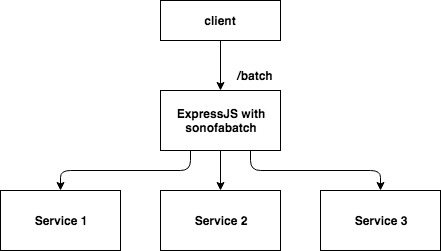sonofabatch
v1.3.1
Published
Instantly add a batch endpoint to your ExpressJS API
Downloads
17
Readme
sonofabatch
Quickly add a batch endpoint to your ExpressJS app or provide a batch facade to an existing JSON REST service.
usage
Attach the batch endpoint.
const express = require('express')
const app = express();
const router = express.Router();
const SonOfABatch = require('sonofabatch');
const batch = new SonOfABatch();
const bodyParser = require('body-parser');
router.post('/batch', batch.call); // make sure you use .post()
app.use(bodyParser.json());
app.use('/', router);
app.listen(3000, () => console.log(`Batch-O-Matic is listening on port 3000!`));All other endpoints can now be called via the /batch endpoint by posting to it with a body such as the following
{
requests :
[
{
method : "GET",
path : "/accounts",
query : { hello : "world" }
},
{
method : "POST",
path : "/accounts",
body : { name : "Important Account" }
}
]
}You should always expect the response to return the results in the order which they were requested.
control flow
By default the calls with execute on the server in parallel. However, if the calls need to be run in order an additional param is supported called 'execution'.
{
execution : "series", // defaults to "parallel"
requests :
[
{
method : "GET",
path : "/accounts",
query : { hello : "world" },
},
{
method : "POST",
path : "/accounts",
body : { name : "Important Account" }
}
]
};as a batch proxy
sonofabatch can be used as batch middleware to proxy calls to existing JSON REST API services. Below is a diagram of the use-case:

To configure sonofabatch as a batch proxy simply provide a serviceUrl in one of 3 places
- on instantiation of the middleware
new SonOfABatch({serviceUrl: 'http://myserviceurl:8080'}); - in the root of the request made to the /batch endpoint. This applies to all calls defined in the request and also overrides 'serviceUrl' passed as a javascript option to
new SonOfABatch();
```
{
serviceUrl: "http://myserviceurl:8080"
requests :
[
{
method : "GET",
path : "/accounts",
query : { hello : "world" }
},
{
method : "POST",
path : "/accounts",
body : { name : "Important Account" }
}
]
}
```- in each individual request (overrides
serviceUrlpassed via methods 1 and 2
```
{
requests :
[
{
serviceUrl: "http://myserviceurl1",
method : "GET",
path : "/accounts",
query : { hello : "world" }
},
{
serviceUrl: "http://myserviceurl2",
method : "POST",
path : "/accounts",
body : { name : "Important Account" }
}
]
}
```params
- serviceUrl: should include protocol:hostname:port
- mergeHeaders: will take the headers from the batch request and add them to the headers of each request defined in the payload
- protocol: only useful when not passing serviceUrl. will set the protocol used when defaulting to 127.0.0.1
- port: only useful when not passing serviceUrl. will set the port used when defaulting to 127.0.0.1
TODO
- add tests
- more meaningful error messaging
